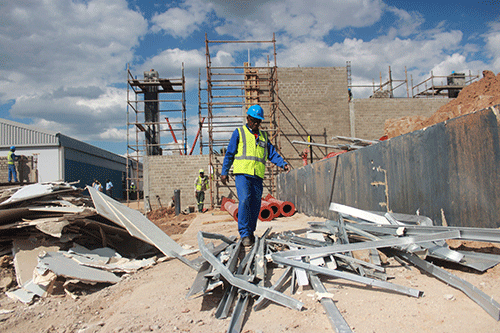THE Namibian Building Workers Pension Fund (NBWPF) is optimistic about the government’s move to increase income tax thresholds as announced in the 2024/25 budget speech delivered by finance and public enterprise minister, Ipumbu Shiimi, at the end of February 2024.
One of the major changes is that the threshold for individual income tax has been increased from N$50 000 to N$100 000.
The implication for the beleaguered construction industry is that many of workers in this sector will no longer have to pay individual income tax. This is expected to ease some of the financial burdens construction workers bear.
Moreover, new minimum wage for Namibia’s construction sector is anticipated to come into force at the end of April 2024, presuming they are published by this time in the Government Gazette. The minimum wage must be published in the gazette to become legally effective as this is also a mandatory requirement for the entire construction sector.
The new minimum wage payable will be N$18.72 per hour for general workers in the industry. Painters, tilers, plumbers, bricklayers, concrete workers, shutterers, scaffolders, electricians, carpenters, joiners, welders, steel fixers, whether they are semi-skilled workers or artisans, are unlikely to pay individual income tax, provided their annual income remains below N$100 000.
“Before the adjustments, the majority of workers in the construction sector needed to pay income tax. The hourly threshold, without taking into consideration overtime payments and bonuses, would then have been approximately N$26.04. Now, the hourly threshold has effectively doubled this amount, i.e. N$52.08”, read a statement from the NBWPF.
The fund continued that this will impact the domestic economy as many of the workers in the construction sector will now have a higher disposable income, and will be able to counter the pressure and effects of high inflation over recent years. “If this leads to more spending then it will have a positive impact on the economy,” the fund stated.
Recognising the potential positive impact on Namibia’s economy due possible greater consumption of goods and services, Enwich Kazondu, executive principal officer of the fund said: “This move by our government is very positive. It not only increases the purchasing power of those with low incomes, but will effectively stimulate our economy, it can also have a great impact on individual’s financial planning and consideration”.
“With more money being available, it will not only allow more spending to meet the needs of daily living, but it can also lead to greater contributions towards retirement savings.
We want to encourage everyone to make use of this break and definitely put more money aside…It may well be worth it to consider an increase in contributions to their pension fund. Currently, the minimum contribution is 4% per month, which is matched by the employer.
We need to look at how we change and increase this in the interest of our members,” the Kazondu stated.
Commenting on the looming tax breaks FNB economist, Ruusa Nandago, said this is a good first step towards making Namibia a more competitive environment for investment. “The tax relief for individuals would be a welcome development as it would ease the pressure on lower-income households from the accelerated inflation seen over the past two years.
“Secondly, there is an expectation of reducing the corporate tax rate from 32% to 31%,” said Nandago.
Meanwhile, in a recent statement, auditing and tax consulting firm, PriceWaterhouseCooper (PWC), noted the tax reprieve would likely see Namibia’s consumer purchasing power strengthened.
“Firstly, for our employed Namibians this would imply that fewer people would have to be registered for personal income tax when the threshold has been increased to N$100 000,” the firm stated.



